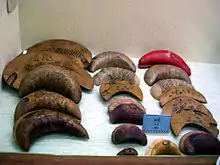Poe divination
Poe divination (from the 'poe' (桮) in the Hokkien Chinese: 跋桮; Pe̍h-ōe-jī: poa̍h-poe, Min Dong BUC: buăk-bŭi, "cast moon blocks", also called as "bwa bwei", Mandarin Chinese: 擲筊; pinyin: zhì jiǎo / zhí jiǎo; lit. 'throwing poe') is a traditional Chinese divination method, in which the divination seeker throws or drops two little wooden pieces on the floor and gets the divine answer by the positions of the pieces whether the future course being contemplated is recommended or not. The pieces, called "Poe" (Bwei) in Taiwanese or Jiaobei in Mandarin, look somewhat like two shells of a clam or bivalve mollusk.[1]

Poe divination can be observed at Taoist temples, such as Guangdi temples and Mazu temples, not only in China and Taiwan, but also in the rest of the world.
See also
References
- Poe (Kotobank) (in Japanese)